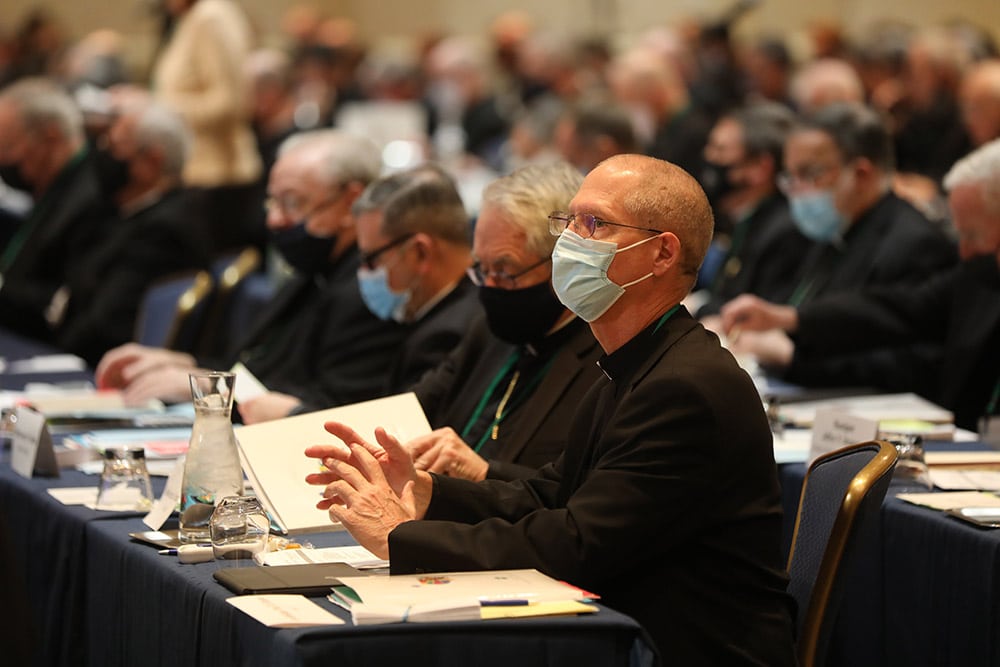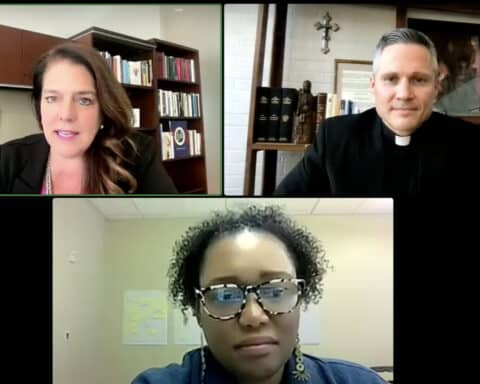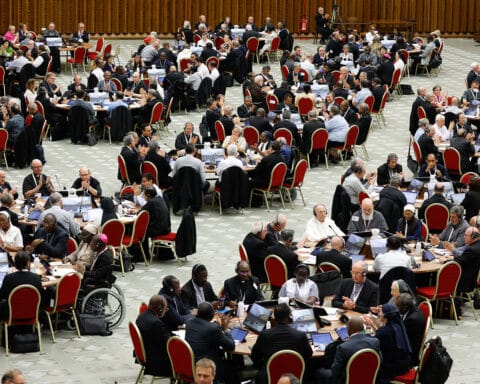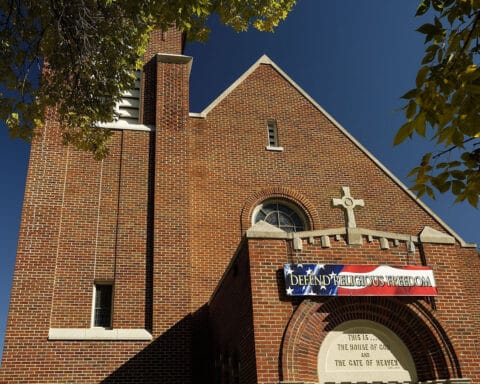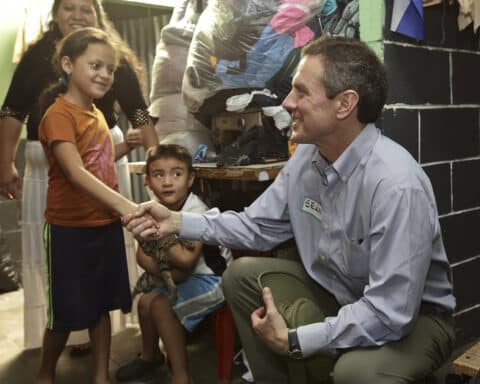As the American bishops gathered for prayer at the start of a meeting that some feared would be contentious, they were reminded that bishops had met in the same setting two centuries earlier and failed to address the burning moral question of their day.
“Our predecessors maintained a kind of unity by avoiding the divisive issue of slavery and then missed the opportunity to serve the pastoral and material needs of the emancipated slaves,” Archbishop William E. Lori of Baltimore told more than 200 cardinals, archbishops and bishops who concelebrated Mass in Baltimore’s historic Basilica of the Assumption. Between 1829 and 1884, the venerable church was the site of seven provincial councils and three plenary councils of the U.S. hierarchy.
The Mass came on the evening of the first day of the Nov. 15-18 general assembly of the U.S. Conference of Catholic Bishops. The big issue facing the bishops now wasn’t slavery but what, if anything, to say about Catholic politicians — President Joe Biden chief among them — who receive Communion while supporting abortion.
In the end, they settled for a general admonition that made no specific mention of Biden or politicians or anybody else. Instead, it repeated the familiar teaching that receiving Communion in a state of mortal sin is a sacrilege and said someone who “knowingly and obstinately” repudiates Church teaching on a moral issue like abortion “should refrain” from Communion.
Whether historians will judge these generalities to arise from pastoral prudence or a policy failure reminiscent of the 19th-century hierarchy’s failure to speak out on slavery is a question for the future to decide.
Certainly, this USCCB meeting — the bishops’ first in-person assembly in two years because of COVID-19 concerns — was in sharp contrast with the fractious virtual assembly held in June, when 55 bishops voted against making any statement at all about what was then called “Eucharistic coherence.” This time around, the final product was approved by a vote of 222-8 with three abstentions.
Why the difference between June and November? The obvious reason is that the draft presented in Baltimore by the bishops’ doctrine committee steered clear of doing what some bishops earlier opposed vociferously — namely, saying Catholic politicians like Biden who support abortion have no right to receive Communion.
Whatever slim chance may have remained that the bishops would say something that specific probably vanished last month when Biden met Pope Francis at the Vatican and, according to the president, the pope told him to go on receiving Communion.
Even so, the issue’s lingering sensitivity was underlined by the fact that USCCB took the precaution of holding the meeting’s first day behind closed doors, with an agenda that included Eucharistic adoration, regional discussions and an executive session for the airing of bishops’ views about the Eucharistic statement among themselves. They also went into executive session at several other points during the meeting.
Although the original idea for the Eucharistic document had been to call out pro-choice Catholic politicians, the finished statement — with the title “The Mystery of the Eucharist in the Life of the Church” — morphed by November into a kind of introduction to USCCB’s big new Eucharistic revival project.
The revival is itself a response to a different sort of crisis — the evidence in recent polls showing that very many U.S. Catholics do not believe that Christ is really present in the Blessed Sacrament. Polls have been showing that for years, however, and many people believe the problem is not so much a failure of faith as it is a failure of catechesis to teach and explain the doctrine of the Real Presence.
During the USCCB assembly, Bishop Andrew H. Cozzens, bishop-designate of Crookston, Minnesota, chairman of the Committee on Evangelization and Catechesis, proposed — and the bishops overwhelmingly approved, 201-17 with five abstentions — a National Eucharistic Congress, now planned for July 17-21 in Indianapolis.
The congress, with a hoped-for attendance of 80,000 or people, will cap the three-year program of activities in dioceses scheduled to begin next year on June 22, the feast of Corpus Christi, with all of it aimed at increasing Catholics’ faith in and reverence for the Eucharist.
In his presidential address at the start of the meeting, Archbishop José H. Gomez of Los Angeles described the National Eucharistic Revival as “a missionary project.” People in secularized America looking for a “story” to give meaning to their lives need to hear “the true story … of Christ’s love for us,” he said, and the revival is a promising way to communicate it to them.
Archbishop Christophe Pierre, the papal nuncio in the United States, gave the bishops something resembling a primer on synodality as the Church moves forward toward the 2023 Synod of Bishops on synodality — Pope Francis’ program on behalf of his vision of the Church of the future. In the spirit of synodality, Archbishop Pierre said, the Church must not only teach but also listen — to others as well as to the Holy Spirit.
In elections, the bishops chose Bishop James Checchio of Metuchen, New Jersey, as treasurer of USCCB; they also selected chairmen-elect of several conference committees: Bishop Earl Boyea of Lansing, Michigan, for the Committee on Clergy, Consecrated Life and Vocations; Bishop Steven Lopes of the Personal Ordinariate of the Chair of Saint Peter — a diocese-like jurisdiction for former Anglicans — as chair of the Committee on Divine Worship; Archbishop Borys Gudziak of the Ukrainian Catholic Archeparchy of Philadelphia to lead the Committee on Domestic Justice and Human Development; and Auxiliary Bishop Robert Barron of Los Angeles as the chairman of the Committee on Laity, Marriage, Family Life and Youth.
The bishops also welcomed a delegation of Orthodox dignitaries to the meeting — the first time that has happened. Archbishop Elpidophoros, chairman of the Orthodox bishops’ national assembly, headed the group and spoke briefly of the importance of a “dialogue of love” as the path to eventual Catholic-Orthodox reunion. The “synodality” now being discussed by Catholics at the urging of Pope Francis provides fruitful matter for that dialogue, he said.
By the meeting’s end, the bishops appeared to be far happier and united than they were in June. Perhaps some pro-choice politicians were happier, too.
Russell Shaw is a contributing editor for Our Sunday Visitor.

